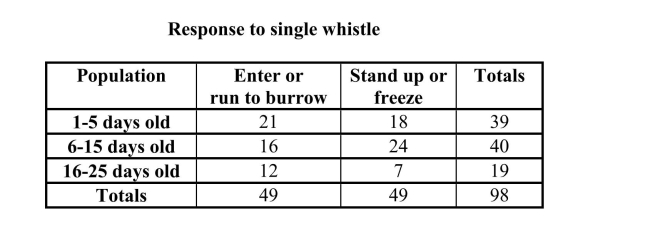Exam 15: Learning From Categorical Data
Exam 1: Collecting Data in Reasonable Ways44 Questions
Exam 2: Graphical Methods for31 Questions
Exam 3: Numerical Methods for31 Questions
Exam 4: Describing Bivariate Numerical Data29 Questions
Exam 5: Probability29 Questions
Exam 6: Random Variables and18 Questions
Exam 7: Selecting an Appropriate Method4 Questions
Exam 8: Sampling Variability Sampling21 Questions
Exam 9: Estimation Using a Single Sample29 Questions
Exam 10: Asking and Answering Questions About a Population Proportion36 Questions
Exam 11: Asking and Answering Questions About the Difference Between Two Population Proportions16 Questions
Exam 12: Asking and Answering Questions About a Population Mean33 Questions
Exam 13: Asking and Answering Questions About the Difference Between Two Means27 Questions
Exam 14: Learning From Experiment Data8 Questions
Exam 15: Learning From Categorical Data22 Questions
Exam 16: Understanding Relationships Numerical12 Questions
Select questions type
Juvenile ground squirrels respond to predators by making what are known as "alarmcalls. These calls can alert others to danger. Newly weaned squirrels emerge fromthe nest at about 25 days of age. Do the squirrels emerge from the nest withautomatic responses to alarm signals, or are the responses learned?
To address thisquestion a biologist played recordings of alarm calls for three samples of groundsquirrels and observed their responses. She reasoned that if the pattern of responseswas the same for the different age groups the squirrels must be responding by instinct.On the other hand, if the responses differ with the age of the squirrels, the youngsquirrels may be learning to respond to the alarm calls. Her data for the responses to
(Essay)
4.7/5  (34)
(34)
Juvenile ground squirrels respond to predators by making what are known as "alarmcalls. These calls can alert others to danger. Newly weaned squirrels emerge fromthe nest at about 25 days of age. Do the squirrels emerge from the nest withautomatic responses to alarm signals, or are the responses learned?
To address thisquestion a biologist played recordings of alarm calls for three samples (by age) ofsquirrels and observed their responses. She reasoned that if the pattern of responseswas the same for the different age groups the squirrels must be responding by instinct.On the other hand, if the responses differ with the age of the squirrels the youngsquirrels may be learning to respond to the alarm calls. Her data for the responses to a single whistle are presented below for each of the three age samples:  Is there convincing evidence that the responses to a single whistle are not the samefor the different age groups?
Test the relevant hypothesis at the 0.05 level.
Is there convincing evidence that the responses to a single whistle are not the samefor the different age groups?
Test the relevant hypothesis at the 0.05 level.
(Essay)
4.9/5  (38)
(38)
Showing 21 - 22 of 22
Filters
- Essay(0)
- Multiple Choice(0)
- Short Answer(0)
- True False(0)
- Matching(0)